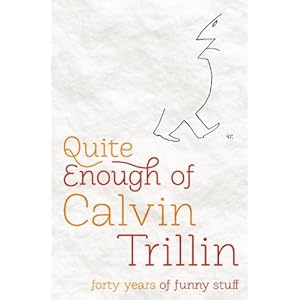Quite Enough of Calvin Trillin: forty years of funny stuff,
or Never Enough of “Enoughness”
By Peg Eby-Jager
 Quite Enough of Calvin Trillin? Never! I add most emphatically that I will never ever tire of reading Trillin’s “stuff.” I will never have had enough of his “enoughness.” Not in this lifetime!
Quite Enough of Calvin Trillin? Never! I add most emphatically that I will never ever tire of reading Trillin’s “stuff.” I will never have had enough of his “enoughness.” Not in this lifetime!
The principle of “enoughness” pioneered by his dear wife and muse Alice was meant to apply broadly to the economy and to personal finance, not as a grand theory reaching into every aspect of our existence. It cannot, for example, be successfully applied to actually reading Trillin—in spite of this new economy, this “new normal,” in which we’re all supposed to get by with less. Less is not more. Moreover, “enough” and therefore “enoughness” does not necessarily mean getting by on “less.” Thus, reading less Trillin is not an option. Or so, the logic might go in Trillin’s world—at least around his house, where his wife and two daughters featured for decades in volleys of witty repartee.
“Enoughness” is a recurring theme in Trillin’s new anthology, Quite Enough—sometimes more, sometimes less. At what point are needs sufficiently met? Desires sated? Quantities adequate? No one really knows. Not even Trillin himself. Alice may have ideas, sincerely believing “that at a certain point an annual income is simply more than anybody could possibly need for even a lavish style of living.” She also thought that the U.S. tax code should reflect this—in stark contrast to Senate majority opinion in 1990 when this essay first appeared in print—but exactly how much was enough, the point at which enoughness was reached was, as far as Alice was concerned, a matter of debate. Trillin tosses out ten million dollars a year as the trigger point for “The Alice Tax,” but only “as long as Alice is not in the room.”
Flash forward nineteen years to 2009, and enoughness is a scarce commodity in “Wall Street Smarts.” We learn, according to a martini-swilling, silver haired, explainer-sage sporting a “club tie that, seen from a distance, seemed adorned with tiny brussel sprouts,” precisely why the global financial system nearly collapsed in 2009. Between sips, he conjured a scenario that’s smart and plausible. And it left me smarting all over again regarding what happened and why: “All that easy money had eaten away at their sense of enoughness.” Jump back to 1983, and in “My Tuxedo,” Trillin recounts with delightful silliness the amortization of his 30-year-old tux which he wore to Ivy League black-tie functions as a college student, on every New Year’s Eve since, and to “events where black-tie is not strictly necessary, like a hog roast or a divorce hearing.” Although “enoughness” is not directly mentioned, “My Tuxedo” makes it apparent that one tux would always be enough for Trillin. I had to wonder if this sense of proportion, of what constitutes a satisfactory quantity, came from his father whose own “strong sense of enoughness” he notes in Messages From My Father: a memoir.
Thankfully, the principle of enoughness does not extend to the table or to travels. Trillin’s hilarious and hyperbolic imagination suffuses “The Italian West Indies,” a culinary romp through “Santo Prosciutto,” his imaginary Caribbean island where the residents are “descendants of peasants who had managed to coax already-stuffed eggplants from the cruel soil of Calabria.” He dreamed up this place in response to New York City’s cold winters and his year-round yearning for fettuccine preferably served alfresco with an ocean-view and a glass of either “raid or whyut” wine. Alice’s admonishment that there “is no such thing as the Italian West Indies,” did little to diminish his imaginings, instead leading him to ponder how Italy managed to end up with no Caribbean islands. “Even the Danes had one for a while,” he mused.
In this anthology’s dedication, we learn that even the pieces that don’t mention Alice “were written in the hope of making her giggle.” Truly, there are lots of giggles and good, deep laughs just waiting for readers in Quite Enough. And the writing doesn’t feel dated. Trillin’s writing never does. I recently read some of his crime reporting dating back to the late 1960s—coverage of murders in Eastern Kentucky, Miami Beach, Tucson, and San Bernardino county—and the prose is pristine. It always is. No telltale tics or quirky phrasing indelibly linking the text to an earlier time. These are not the missives of a bygone era. The same is also true of Trillin’s novels, his memoirs, his culinary writing, and his satirical commentary. But his “funny stuff” has weathered time particularly well. Everything in this anthology is so fresh, it feels as though it was written yesterday. And it’s funny. It’s very funny stuff.